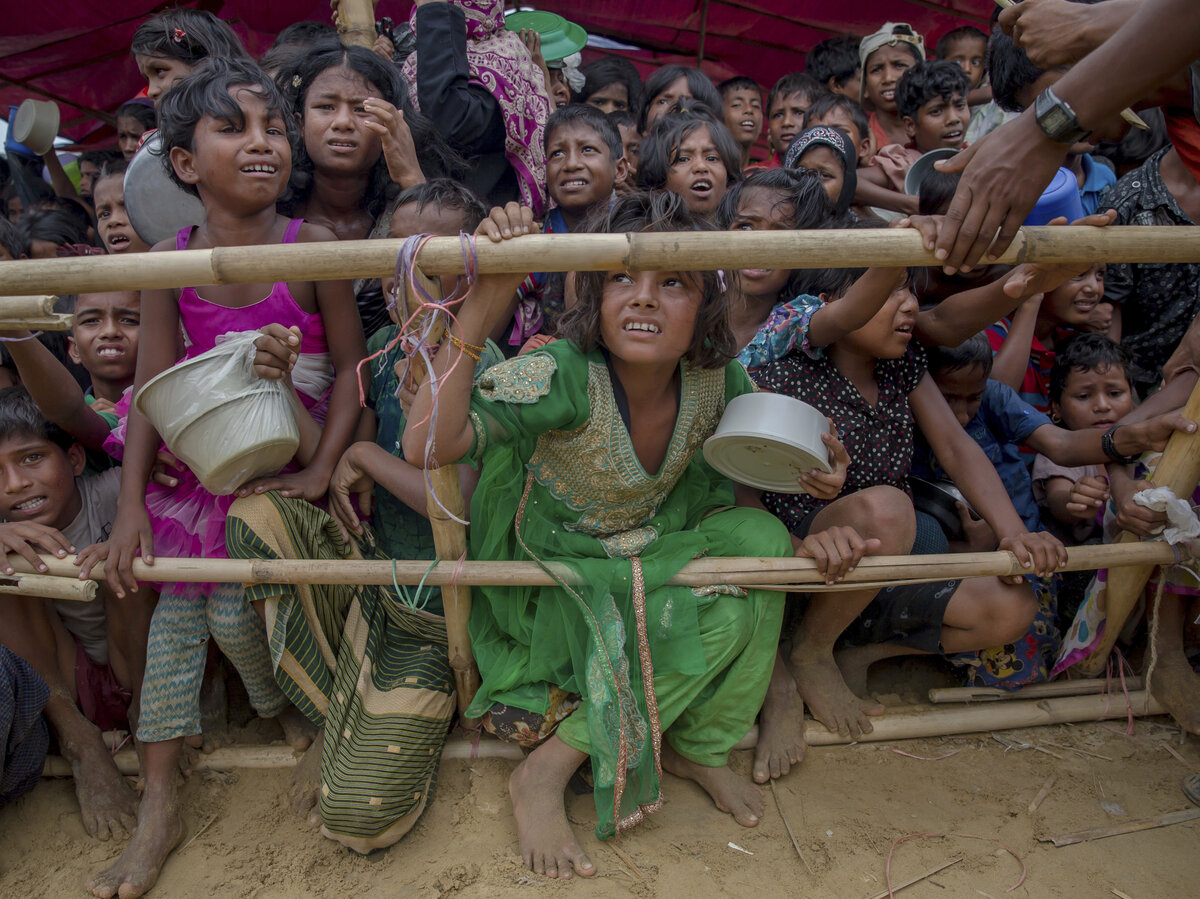by TAPAN BOSE
 “Rohingya Muslim children, who crossed over from Myanmar into Bangladesh, wait squashed against each other to receive food handouts distributed to children and women by a Turkish aid agency at Thaingkhali refugee camp, Bangladesh, in October.” PHOTO/Dar Yasin/AP/NPR
“Rohingya Muslim children, who crossed over from Myanmar into Bangladesh, wait squashed against each other to receive food handouts distributed to children and women by a Turkish aid agency at Thaingkhali refugee camp, Bangladesh, in October.” PHOTO/Dar Yasin/AP/NPR
The protracted Rohingya refugee crisis and in particular the latest cycle of hundreds of thousands of Rohingya people fleeing the massive military crackdown on an un-armed minority community should not be viewed as an isolated event. It should be examined in the context of the rivalry between China and the US, the West and India for control over Myanmar’s economic and mineral resources. In September 2017, Nikki Haley, the US Ambassador to the UN, did not mince her words in condemning the Myanmar military’s brutal crackdown that had forced Rohingya Muslim refugees to stream across the international border of Myanmar’s Rakhine state into neighboring Bangladesh. In her speech she had said, “The time for well-meaning diplomatic words” had passed and that “we must now consider action against Burmese [Myanmar] security forces who are implicated in abuses and stoking hatred among their fellow citizens.” She also called on Myanmar to “immediately remove and prosecute those accused of abuses.”
More than a year has passed. The USA and the West and the United Nations have done little more than, issue stronger words of condemnation and donate a few million dollars for housing and feeding the Rohingya refugees in Bangladesh. Despite the recent statement of United Nations Special Advisor on Genocide that the intent of the Myanmar army “was to cleanse northern Rakhine of the existence of Rohingya, possible even to destroy the Rohingya as such, which if proven would constitute Genocide” and his call for “immediate action”, it is extremely unlikely that the international community will initiate punitive action against Myanmar.
While the West had criticized Myanmar, China had praised Myanmar’s army for its tough and prompt actions for maintaining stability in Rakhine state. It is interesting to note that while the US Secretary of State labeled the military actions against Rohingyas as “ethnic cleansing”, India, USA’s strategic partner in South Asia, was on the same page with China, when it defended Myanmar military’s crackdown against the Rohingya as war against “terrorism”.
We are told that it is the fear that China might take advantage of this humanitarian crisis and regain its influence over Myanmar which the US and the West has been trying to lessen since the re-establishment of so-called democratic governance in Myanmar. Indian Prime Minister, Narendra Modi during his visit to Myanmar in September 2017 used the USA’s grand narrative of “War on Terror” in an attempt to link the so-called concerted attack by ARSA on 30 border police stations with “Islamic Terror”. Seeing a link between Myanmar military and the Bamar-Buddhist terrorist attacks on Rohingyas with the US and West sponsored global campaign against Islamic terrorism, will seem farfetched today, yet looking at India’s support of the ruthless Myanmar army, which has been leading genocidal attacks on the Rohingyas and the virulent anti Muslim propaganda by the Barmar-Buddhists, describing Muslims as dogs, one wonders whether keeping this region, and particularly Rakhine, in turmoil, is in the interest of the US and the West, which is keen to contain China’s growing economic and strategic influence in this region.
The right-wing Hindu government of India exposed itself when in a sudden volte face it singled out the forty thousand Rohingya refugees living in India for more than a decade for deportation on the ground that they were a potential threat to its nation security. The Indian government asserts that the Rohingya refugees are connected with “terrorist” organisations and claims that it is in possession of secret intelligence information on links with ISIS and Pakistani militants. No evidence has been produced. Many Indian and international analysts believe that Indian government’s treatment of the Rohingya stems from the ruling BJP’s “Islamophobia” as well as domestic political calculations that a tough line on Muslim refugees will play well with the party’s Hindu nationalist base.
Alternatives International for more
